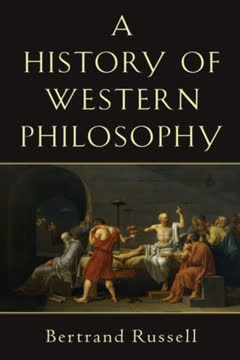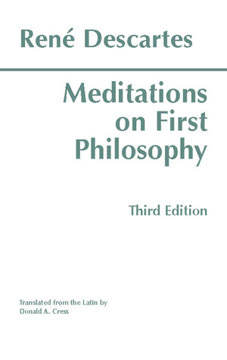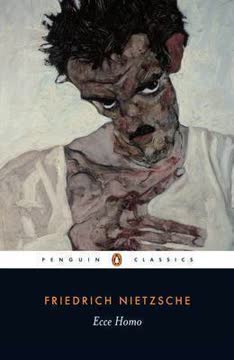النقاط الرئيسية
1. احتضان القدر: حب القدر كسر عظمة
صيغتي للعظمة في الإنسان هي حب القدر: أن يرغب المرء في ألا يكون هناك شيء مختلف، لا للأمام، ولا للخلف، ولا في كل الأبد.
قبول القدر. يرى نيتشه أن العظمة الحقيقية تكمن في حب القدر، وهو حب القدر. وهذا يتطلب ليس فقط تحمل ما هو ضروري، بل احتضانه بنشاط، ورغبة في عدم تغيير أي شيء في الماضي أو الحاضر أو المستقبل. هذا القبول ليس استسلامًا سلبيًا، بل تأكيدًا نشطًا على جميع جوانب الوجود.
تجاوز المثالية. يقف حب القدر في مواجهة مباشرة مع المثالية، التي يعتبرها نيتشه محاولة كاذبة للهروب من الحقائق الضرورية للحياة. تسعى المثالية لفرض نظام زائف على العالم، بينما يقبل حب القدر العالم كما هو، بكل عيوبه وتناقضاته.
الطبيعة الثنائية للوجود. من خلال احتضان القدر، يتجاوز المرء حدود الحاضر ويكتسب فهمًا عميقًا للترابط بين جميع الأشياء. هذه النظرة تتيح تفاؤلًا وثقة في القدر، إيمانًا بأن كل شيء يتم استرداده وتأكيده في الكل.
2. الانحطاط والصحة: إرث مزدوج
هذا الانحدار المزدوج، كما لو كان، من أعلى وأسفل درجات سلم الحياة، في نفس الوقت انحطاط وبداية—هذا، إن كان هناك شيء، يفسر تلك الحيادية، تلك الحرية من كل تحيز فيما يتعلق بالمشكلة الكلية للحياة، التي قد تميزني.
تناقض وجود نيتشه. يحدد نيتشه نفسه كونه انحطاطيًا وعكسه، بداية. تنبع هذه الثنائية من سلالته، حيث ورث كل من الحيوية والاستعداد للانحدار. تمنحه هذه الوضعية الفريدة منظورًا نادرًا، خاليًا من التحيزات التي غالبًا ما تعكر صفو الحكم.
الانحطاط كتجربة تعلم. يعترف نيتشه بتجاربه مع المرض والانحدار، لكنه يعيد صياغتها كجزء أساسي من فهمه. هذه الفترات من انخفاض الحيوية sharpened حواسه وسمحت له بتطوير وعي حاد بالإشارات الدقيقة للصعود والانحدار.
الإرادة للصحة. على الرغم من ميوله الانحطاطية، يؤكد نيتشه على قدرته الغريزية في اختيار الوسائل الصحيحة لمكافحة الحالات البائسة. هذه "الإرادة للصحة" هي قوة دافعة في حياته، تقوده إلى البحث عن العزلة، ورفض الرعاية التقليدية، وفي النهاية تحويل معاناته إلى مصدر للقوة والبصيرة.
3. طريق الفيلسوف: العزلة، القوة، وإتقان الذات
الفلسفة، كما فهمتها وعشتها حتى الآن، تعني العيش طوعًا بين الجليد والجبال العالية—البحث عن كل ما هو غريب ومثير للشك في الوجود، كل ما تم وضعه حتى الآن تحت حظر الأخلاق.
رحلة الفيلسوف. يصف نيتشه الفلسفة كمسعى وحيد وصعب، رحلة إلى الجوانب المحظورة والمثيرة للشك في الوجود. تتطلب هذه الطريق شجاعة، انضباطًا ذاتيًا، واستعدادًا لمواجهة الحقائق غير المريحة.
رفض الراحة. يجب على الفيلسوف رفض الراحة والمشتتات في الحياة التقليدية، بما في ذلك الزواج، وتوقعات المجتمع، والسعي وراء الشهرة. تُعتبر هذه الأمور عقبات أمام المهمة الحقيقية للفيلسوف: السعي وراء المعرفة وإتقان الذات.
أهمية القوة. طريق الفيلسوف ليس للضعفاء. يتطلب إرادة قوية، وقدرة على تحمل المشاق، والتزامًا لا يلين بالحق. فقط أولئك الذين يمتلكون هذه الصفات يمكنهم أن يأملوا في بلوغ آفاق الفهم الفلسفي.
4. ما وراء الخير والشر: إعادة تقييم القيم
لا أنكر المثالية، بل أضع فقط قفازات قبلها.
نقد الأخلاق. تركز فلسفة نيتشه على إعادة تقييم جميع القيم، تساؤل جذري حول المفاهيم الأخلاقية التقليدية للخير والشر. يجادل بأن هذه القيم ليست حقائق موضوعية، بل هي في الغالب بناءات بشرية، متجذرة في الضعف والحنق.
موت المثالية. يسعى نيتشه إلى تفكيك "كذبة المثالية"، التي يعتبرها لعنة على الواقع. من خلال كشف الأصول والدوافع وراء القيم الأخلاقية، يهدف إلى تحرير الإنسانية من تأثيرها القمعي.
تأكيد الحياة. إعادة تقييم القيم ليست غاية في حد ذاتها، بل وسيلة لتحقيق هدف أكبر: تأكيد الحياة بكل تعقيدها وغموضها. يسعى نيتشه إلى خلق مجموعة جديدة من القيم التي تحتفل بالقوة، والإبداع، وإرادة القوة.
5. المثالية الزهدية: إرادة القوة على الحياة نفسها
تعبر المثالية الزهدية عن إرادة: أين الإرادة المعاكسة التي قد تعبر عن مثالية معاكسة؟
طبيعة المثالية الزهدية. يحدد نيتشه المثالية الزهدية كقوة شاملة في تاريخ البشرية، تتميز برفض الملذات الأرضية والتركيز على التطهير الروحي. هذه المثالية ليست مجرد مسألة إنكار الذات، بل تجسيد لإرادة القوة.
الكاهن كمدير. الكاهن الزهدي هو الشخصية الرئيسية في تعزيز هذه المثالية، مستخدمًا إياها كأداة للسيطرة على الجماهير المعذبة. من خلال إعادة توجيه حنقهم إلى الداخل، يحافظ الكاهن على سلطته ويمنع القطيع من تحدي النظام القائم.
الحياة ضد الحياة. تمثل المثالية الزهدية تناقضًا أساسيًا: إنها الحياة التي تتجه ضد نفسها، تسعى لقمع غرائزها ورغباتها. هذه الدافع المدمر للذات متجذر في النهاية في الخوف من الحياة ورغبة في العدم.
6. خداع الكاهن: الأخلاق كأداة للسيطرة
الكاهن الزهدي هو الرغبة المتجسدة في أن يكون مختلفًا، ليكون في مكان مختلف، وفي الواقع هذه الرغبة في أقصى درجاتها، حماستها وشغفها المميز؛ لكن بالضبط هذه القوة لرغبته هي السلسلة التي تقيده بحيث يصبح أداة لإنشاء ظروف أكثر ملاءمة للوجود هنا وكونه إنسانًا.
دور الكاهن. الكاهن الزهدي ليس معالجًا حقيقيًا، بل هو متلاعب يستغل معاناة الآخرين للحفاظ على سلطته. يقدم العزاء والراحة، ولكن فقط من خلال تعزيز المرض الكامن.
إعادة تفسير المعاناة. الأداة الأكثر فعالية للكاهن هي إعادة تفسير المعاناة كذنب. من خلال إقناع المرضى بأنهم مسؤولون عن بؤسهم، يعيد توجيه حنقهم إلى الداخل ويمنعهم من تحدي النظام القائم.
نشوة المشاعر. يستخدم الكاهن تقنيات متنوعة لإحداث نشوات من المشاعر، مستخدمًا الذنب، والخوف، ووعد الخلاص للسيطرة على عواطف قطيعه. توفر هذه الانفعالات الزائدة راحة مؤقتة، لكنها تترك المرضى في النهاية أكثر مرضًا.
7. قيمة الحقيقة: نقد المعرفة
تتطلب الإرادة للحقيقة نقدًا—دعونا نحدد مهمتنا الخاصة—يجب أن تُختبر قيمة الحقيقة مرة واحدة بشكل تجريبي.
المبالغة في تقدير الحقيقة. يتحدى نيتشه الافتراض الفلسفي التقليدي بأن الحقيقة قيمة مطلقة. يجادل بأن الإرادة للحقيقة، مثل أي دافع آخر، يجب أن تخضع للتفحص النقدي.
العلم كتجسيد للمثالية الزهدية. يرى نيتشه أن العلم الحديث هو استمرار للمثالية الزهدية، مدفوعًا برغبة مماثلة في إنكار الذات ورفض الملذات الأرضية. يؤدي العلم، في سعيه نحو الموضوعية، غالبًا إلى تقليل قيمة التجربة الإنسانية وإحساس باللامعنى.
الحاجة إلى التبرير. يجادل نيتشه بأن العلم، مثل أي مسعى إنساني آخر، يحتاج إلى تبرير. يجب أن يُظهر أنه يخدم غرضًا أعلى، ويساهم في تعزيز الحياة وإرادة القوة.
8. الروح الديونيسية: التأكيد في مواجهة المعاناة
قول نعم للحياة حتى في أغرب وأصعب مشكلاتها؛ الإرادة للحياة تفرح بلامحدوديتها حتى في تضحية أعلى أنواعها—هذا ما أسميته ديونيسية.
جوهر الروح الديونيسية. يقارن نيتشه المثالية الزهدية بالروح الديونيسية، التي تمثل تأكيدًا مبهجًا للحياة في جميع جوانبها، بما في ذلك المعاناة والدمار. تحتضن الروح الديونيسية كمال الوجود، وتجد الفرح حتى في مواجهة أصعب المشكلات.
المأساة كتأكيد. يرى نيتشه أن المأساة هي أعلى تعبير عن الروح الديونيسية. لا تسعى المأساة للهروب من المعاناة، بل تحتفل بها كجزء لا يتجزأ من عظمة الحياة.
ما وراء التشاؤم. تتجاوز الروح الديونيسية التشاؤم من خلال تأكيد التكرار الأبدي لكل الأشياء. تتيح هذه النظرة للمرء احتضان كمال الوجود، مع العلم أن حتى أكثر اللحظات إيلامًا ستتكرر بلا نهاية.
9. إيكه هومو: انظر إلى الإنسان - صورة جديدة للإنسانية
أنا شيء واحد، وأعمالي شيء آخر.
صورة ذاتية. إيكه هومو هو محاولة نيتشه لتعريف نفسه وعمله، لتقديم صورة جديدة للإنسانية تتجاوز قيود الأخلاق والفلسفة التقليدية. إنها صورة ذاتية مصممة بأسلوب عالٍ وواعية، تهدف إلى تحدي المفاهيم التقليدية للعظمة والحكمة.
سقراط الفني. يقدم نيتشه نفسه كـ "سقراط الفني"، فيلسوف يجمع بين العقل النقدي وتأكيد الحياة الديونيسية. هذه الشخصية ليست حكيمًا هادئًا، بل مفكرًا شغوفًا واستفزازيًا يحتضن كل من الفرح والمعاناة.
دعوة للعمل. إيكه هومو ليست مجرد صورة ذاتية، بل هي أيضًا دعوة للعمل. يتحدى نيتشه قراءه لاحتضان مصائرهم الخاصة، لخلق قيم جديدة، ولتصبحوا رجال الغد.
آخر تحديث::
FAQ
What is "On the Genealogy of Morals / Ecce Homo" by Friedrich Nietzsche about?
- Dual focus: The book combines two works: "On the Genealogy of Morals," which investigates the origins and evolution of moral concepts, and "Ecce Homo," Nietzsche’s self-portrait and philosophical manifesto.
- Critique of morality: Nietzsche challenges traditional moral values, especially Christian morality, arguing that they are historically contingent and often life-denying.
- Philosophical method: Both works blend historical, psychological, and philosophical analysis, using irony, wit, and self-examination to question accepted truths and values.
Why should I read "On the Genealogy of Morals / Ecce Homo" by Friedrich Nietzsche?
- Profound critique of morality: The book offers a deep, original analysis of the roots and consequences of moral values, prompting readers to reconsider their assumptions.
- Direct insight into Nietzsche: "Ecce Homo" provides Nietzsche’s own interpretation of his philosophy and life, clarifying his intentions and ideas.
- Literary and philosophical artistry: Nietzsche’s style is provocative, artistic, and intellectually challenging, making the book a masterpiece of both philosophy and literature.
What are the key takeaways from "On the Genealogy of Morals / Ecce Homo" by Friedrich Nietzsche?
- Revaluation of values: Nietzsche calls for a radical reassessment of traditional moral values, especially those rooted in Christianity and ressentiment.
- Affirmation of life: He advocates for "amor fati"—the love of fate—and the creation of life-affirming values that embrace strength, creativity, and joy.
- Role of the philosopher: Nietzsche sees the philosopher as a creator and destroyer of values, someone who must break old idols and challenge prevailing truths.
How does Nietzsche define "master morality" and "slave morality" in "On the Genealogy of Morals"?
- Master morality: Originates from the noble and powerful, valuing strength, nobility, and pride, with "good" defined by what is noble and "bad" as what is common.
- Slave morality: Emerges from the oppressed, valuing humility, pity, and meekness, with "good" as what alleviates suffering and "evil" as the qualities of the masters.
- Value inversion: Slave morality inverts the values of the masters, driven by ressentiment and a desire for revenge.
What is "ressentiment" according to Nietzsche in "On the Genealogy of Morals"?
- Psychological resentment: Ressentiment is a deep-seated resentment and envy experienced by the powerless, leading to the creation of slave morality.
- Value creation: It drives the inversion of master values, glorifying weakness and condemning strength.
- Key to moral psychology: Nietzsche considers ressentiment a major contribution to understanding the psychological mechanisms behind moral judgments.
How does Nietzsche explain the origin of guilt and bad conscience in "On the Genealogy of Morals"?
- Debt and punishment: Guilt originates from early creditor-debtor relationships, where failing to repay debts led to punishment and suffering.
- Internalization of instincts: The rise of society forces natural instincts inward, creating self-punishment and the "bad conscience."
- Role of ascetic priests: Priests exploit bad conscience by interpreting suffering as guilt and sin, deepening self-torment and promoting self-denial.
What are ascetic ideals and how does Nietzsche critique them in "On the Genealogy of Morals"?
- Self-denial and control: Ascetic ideals involve self-mortification and the rejection of life’s pleasures, often promoted by priests and philosophers.
- Instrument of power: These ideals serve as tools for controlling others, intensifying guilt and self-discipline.
- Life’s paradoxical struggle: Nietzsche sees asceticism as both a symptom of life’s sickness and a paradoxical affirmation of the will to power.
How does Nietzsche view the relationship between science and the ascetic ideal in "On the Genealogy of Morals"?
- Science as an ally: Nietzsche argues that science unconsciously supports the ascetic ideal, sharing its overvaluation of truth and life-denying tendencies.
- Will to truth: The scientific pursuit of truth is rooted in the same ascetic faith, demanding intellectual rigor that can become self-denial.
- Critique of objectivity: Nietzsche challenges the idea of scientific objectivity, emphasizing that all knowledge is shaped by values and perspectives.
What is Nietzsche’s concept of "amor fati" and how does it shape his philosophy in "Ecce Homo"?
- Love of fate: "Amor fati" means embracing one’s fate and loving life in all its aspects, including suffering and hardship.
- Affirmation over denial: Nietzsche rejects pity and resentment, advocating for strength, self-overcoming, and joy in existence.
- Central to his worldview: This concept underpins Nietzsche’s call for a revaluation of values and a life-affirming philosophy.
How does Nietzsche describe his relationship with Richard Wagner in "Ecce Homo"?
- Early admiration: Nietzsche initially saw Wagner as a revolutionary artist and a profound influence.
- Critical break: He later distanced himself, criticizing Wagner’s turn toward German nationalism and cultural decadence.
- Complex gratitude: Despite their break, Nietzsche acknowledges Wagner’s significant role in his intellectual development.
What does Nietzsche mean by being "the first immoralist" in "Ecce Homo"?
- Rejection of traditional morality: Nietzsche uses "immoralist" to signify his break with conventional, especially Christian, moral values.
- Creation of new values: He sees himself as a destroyer of old values and a creator of new, life-affirming ones.
- Psychological insight: Nietzsche’s immoralism involves recognizing the harm of traditional morality and the need for courage and truthfulness.
What are the best quotes from "Ecce Homo" by Friedrich Nietzsche and what do they mean?
- "I am no man, I am dynamite." Nietzsche sees himself as a revolutionary force destined to shatter old values and provoke a crisis in human conscience.
- "Amor fati: that one wants nothing to be different, not forward, not backward, not in all eternity." This expresses his ideal of loving one’s fate unconditionally and embracing life’s totality.
- "I am the first immoralist: that makes me the annihilator par excellence." Nietzsche claims his role as the first to reject traditional morality and to create new values.
- "The good are unable to create; they are always the beginning of the end." He challenges the conventional valorization of "goodness," suggesting it often hinders creativity and vitality.
- "The whole surface of consciousness must be kept clear of all great imperatives." Nietzsche advises allowing the authentic self to emerge naturally, free from imposed moral commands.
مراجعات
في "أصول الأخلاق / إيكه هومو" يستكشف نيتشه جذور الأخلاق وتأملاته الذاتية. يقدّر القراء رؤى نيتشه النفسية، ونقده للدين، وأفكاره المثيرة حول القوة والقيم. يجد الكثيرون أسلوب كتابته شعريًا ومليئًا بالحكم، رغم أن البعض يواجه صعوبة في تعقيده. يُعتبر الكتاب أساسيًا للفلسفة وعلم النفس الحديث، حيث أثر في مفكرين مثل فرويد وفوكو. وعلى الرغم من كونه مثيرًا للجدل، يثمّن القراء وجهة نظر نيتشه الفريدة حول الطبيعة البشرية والأخلاق، حتى وإن لم يتفقوا دائمًا مع استنتاجاته.
Similar Books























